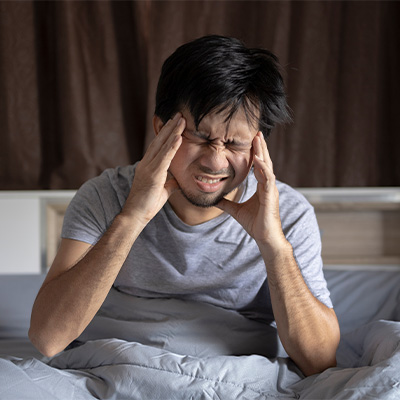Symptoms of Vertigo

Nausea and vomiting

Balance problems

Headaches

Motion sickness
Vertigo FAQ
Vertigo is a sensation that the environment around you is spinning in circles. It can make you feel dizzy and off-balance. Vertigo isn’t a disease. Rather, it’s a symptom of varying conditions.
There are two main types of vertigo:
• Peripheral vertigo: This happens when there’s a problem with the inner ear.
• Central vertigo: This occurs when there’s an issue with the brain. Causes can include infection, brain tumors, traumatic brain injury or stroke.
While both dizziness and vertigo are considered balance problems, the two symptoms are different. Dizziness is an overall feeling of being unbalanced. With vertigo, you have a sensation that you’re moving or that your surroundings are spinning.
Vertigo attacks can happen at any age, but they’re more common in people over 65. Women are somewhat more likely to experience vertigo than men. Some people experience vertigo as a side effect of pregnancy.
Vertigo is a common issue. Nearly 40% of Americans experience vertigo at least once during their lifetime.
On average, vertigo attacks last several seconds to several minutes. In severe cases, however, people can experience vertigo for hours, days, weeks or even months.
Many people compare vertigo to motion sickness. It can make you feel like you’re spinning, rocking or tilting. Feelings of unbalance may worsen when you stand, walk, change positions or move your head.
Vertigo can be scary but the condition itself isn’t considered serious. However, vertigo can be linked to other potentially serious health conditions. That’s why you should inform your healthcare provider if you experience recurrent or prolonged vertigo attacks.
While vertigo isn’t hereditary, it can be a symptom of a range of conditions — some of which run in families. Therefore, frequent vertigo attacks could involve genetic factors.
Many people who have migraines also experience vertigo during episodes. Vertigo may occur before the onset of a headache, during a headache or — most commonly — during a headache-free period. It should be noted, though, that some people have vertigo as their main migraine symptom instead of a headache.
Stress itself doesn’t cause vertigo, but it can contribute to inner ear dysfunction. This can lead to vertigo attacks in some people. Approximately 5% of American adults experience vertigo when they’re anxious or stressed.
As mentioned above, vertigo is a symptom of many different conditions. However, vertigo can also occur in combination with other symptoms, including:
• Nausea and vomiting.
• Balance problems.
• Tinnitus.
• Headaches.
• Motion sickness.
• A feeling of fullness in the ear.
• Nystagmus, in which the eyes move side to side uncontrollably
Your healthcare provider will perform a physical examination and ask questions about your symptoms. They may also recommend one or more tests to confirm your diagnosis.
Vertigo goes away on its own in many cases. However, there are several treatments that can successfully manage vertigo.
There isn’t enough evidence to prove that vertigo can be treated with alternative therapies. However, some people take herbal supplements to ease their symptoms. Popular herbal vertigo remedies include:
• Turmeric.
• Ginkgo biloba.
• Cayenne.
• Ginger root.
• Gongjin-dan.
Be sure to talk to your healthcare provider before adding any herbal supplements to your diet. They can help you safely incorporate them into your regimen.
There are a few steps you can take to reduce your risk for vertigo. These include:
• Taking extra time to stand up, turn your head or perform other triggering movements.
• Sleeping with your head elevated on two pillows.
• Sitting down as soon as you feel dizzy.
• Squatting instead of bending over when picking something up
Vertigo Articles
Vertigo Videos

Vertigo Management at Home – Basic Exercise
To help manage the symptoms of vertigo, watch and follow these simple exercises.









